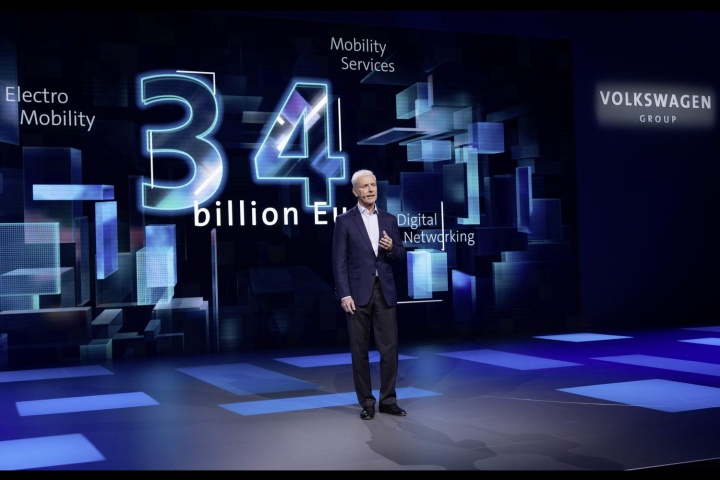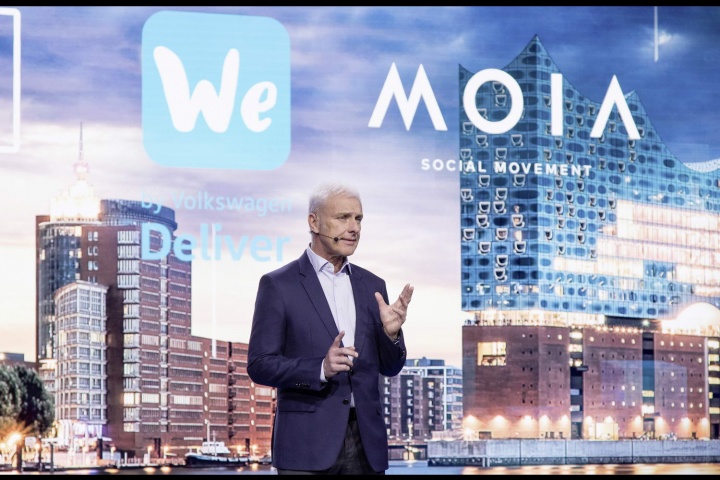What's the news?
"We want to redefine urban mobility, and to that end we are systematically focusing on people and their needs, and not primarily on technology." These are the words of the Volkswagen Group CEO, Matthias Müller, said at the traditional Group Media Night on the eve of the Geneva Motor Show. He said them as Volkswagen presented more of its plan to put more electric vehicles on the road, put more drivers and passengers into those cars, and to continue to drive Volkswagen's focus away from those pesky diesel engines. And the key to all this? Robots.
Well, one robot apparently. The CarLa, which Volkswagen has developed in collaboration with automation specialist Kuka. Unlike Honda's Asimo, which can walk and talk, CarLa is a robotic arm on wheels, and is designed to help you plug your electric car in for charging, saving you the bother either when you're already many metres away because you've parked the car autonomously, or because it's chucking down and you don't want to get soaked, fiddling with cables and plugs.
"People will only accept this technology if they can charge their vehicles quickly, easily and conveniently. I am convinced that the future belongs to service robots like 'CarLa'. And I am delighted that Kuka and the Volkswagen Group are the trailblazers", Müller said.
Müller also pointed out that research from the UN shows that by 2050, 70 per cent of humanity will be living in cities, so autonomous and zero-emissions driving will be key to keeping us all on the road. "The future of mobility lies first and foremost in cities and metropolitan areas. That is where the most pressing problems are to be found - and where both the need and the potential for change are at their greatest", Müller said: "If we want to preserve the freedom of individual mobility, then we have to say goodbye to many things we associate with driving today. We must rethink and redefine mobility. And we will be stepping up our efforts in this regard even further."
Volkswagen reckons it needs to be across all possible variants of such tech, citing predictions that cities such as San Francisco will see a growth in private electric cars, while Beijing will need dedicated expressways for fully autonomous pods, but Mumbai will need more shared mobility and smarter public transport systems.
Volkswagen is using Hamburg as a test case, handing out 50 e-Golfs to various users to get research data and personal feedback; using the MAN trucks brand to develop autonomous cargo trucks, working in the busy port of Hamburg; and using its MOIA autonomous car sub-brand to trial a ride-sharing electric shuttle service.
Added to which is Volkswagen's Roadmap-E plan, which will see a huge growth in the number of electric vehicles that it makes, kicking off later this year with the all-electric Audi e-Tron Quattro, and in 2019 with the 500km range Volkswagen ID hatchback. Summing up, Müller said: "In spite of all the challenges, particularly those we are facing in cities, we want to be part of the solution. I am convinced that the Volkswagen Group with its 12 brands is better placed to achieve that than any other mobility group. Because as a group, we have the dimension and the globality to really change things. Because today, we already reflect almost every facet of mobility: from the motorbike to the city bus, from budget to luxury. And because - irrespective of all the love of cars that makes us who we are and defines our success - we have understood that, ultimately, technology is always only a means to an end."





